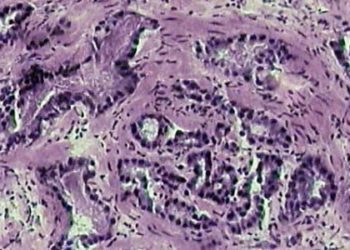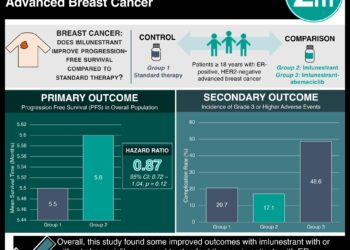Anti-IL-1β antibody, Canakinumab, lowers plasma inflammatory biomarkers independently of plasma lipids and is well-tolerated in diabetics
Image: PD/CDC. Atherosclerotic Aorta.
Key study points:
1. Monoclonal antibody inhibition of IL-1β lowered inflammatory markers in type 2 diabetes patients, on or off statin therapy.
2. IL-1β inhibition did not significantly affect plasma cholesterol (HDL-C, LDL-C), glucose or measures of insulin resistance in this group.
3. Moderate neutropenia was seen in both groups but greater in the treatment groups while other adverse events were comparable.
Primer: The inflammatory hypothesis of atherosclerosis suggests that chronic inflammation increases risk of cardiovascular complications independently of other risk factors, including cholesterol. Inflammation has long been thought to influence atherogenesis from macrophage and T cell recruitment to the artery wall to plaque rupture. In humans, establishing the independent benefit of reducing inflammation to lowering cardiovascular risk has been difficult. The JUPITER trial in 2008 demonstrated that patients with normal LDL-C but elevated high sensitivity C-reactive protein (hsCRP), a marker of inflammation, had reduced cardiovascular events when treated with a statin. But because these patients also experienced reductions in LDL-C in addition to hsCRP, interpretation of the contribution from reducing inflammation proved difficult.
In 2011 the Canakinumab Anti-inflammatory Thrombosis Outcomes Study (CANTOS) was initiated to formally test the contribution of targeting inflammation to lowering cardiovascular risk. Canakinumab is a monoclonal antibody developed to target IL-1β, a systemic inflammatory cytokine with a role in plaque development. Human studies have shown a clear association of IL-1β and related cytokine levels with coronary disease risk factors and events, making it a prime target for both lowering risk and for testing the inflammatory hypothesis.
This study in Circulation tests safety and efficacy of Canakinumab in lowering plasma inflammatory biomarkers in patients with type 2 diabetes mellitus (T2DM), a heart disease risk-equivalent also associated with chronic inflammation.
Background reading:
2. Effect of interleukin 1β inhibition in cardiovascular disease.
3. Inflammation in atherosclerosis: from pathophysiology to practice.
This [phase II randomized controlled study] study: 556 adults with T2DM well-controlled on metformin were randomized to receive a monthly dose of canakinumab (5, 15, 50, or 150 mg) or placebo for 4 months. Hemoglobin A1c (HbA1c), glucose, insulin, lipids, hsCRP, IL-6 and fibrinogen levels and safety were evaluated at each visit.
Treatment with Canakinumab significantly lowered plasma hsCRP, IL-6 and fibrinogen relative to placebo in patients with or without statin treatment. Dose-dependent reductions in all 3 plasma biomarkers were noted for doses 5-50 mg. Reduction of biomarkers with the 150 mg dose was slightly less than that seen with 50 mg. Larger reductions in these biomarkers were noted for patients with baseline hsCRP levels > 2 mg/L. Treatment caused neutropenia in 10.7% in the treatment arm vs. 4.6% in placebo without complications, and other adverse events were uncommon and comparable in both study arms.
In sum: This phase IIb safety trial demonstrated that targeting vascular inflammation with an anti-IL-1β monoclonal antibody Canakinumab was well-tolerated in patients with well-controlled T2DM, a risk-equivalent for CAD. Because Canakinumab significantly reduced hsCRP, IL-6 and fibrinogen, all plasma biomarkers of inflammation, without affecting HDL-C or LDL-C levels, this therapy offers promise in testing the inflammatory hypothesis of atherosclerosis in a larger outcomes study.
The study’s strengths included evaluation of multiple plasma biomarkers as downstream effectors of altered inflammation after treatment. However, study did not formally evaluate for or exclude individuals with diabetic microvascular disease, which could potentially confound interpretation of anti-inflammatory therapy in this population. In addition, there was high variability of ethnicity in each treatment group, which may influence baseline hsCRP and other biomarker levels. Moreover, statin use was varied in the study overall. Despite these, the study was powered sufficiently to show efficacy in reduction of inflammatory biomarkers across ethnicities with and without statin treatment. Overall, this study provides a greater impetus for evaluating the final results of the ongoing CANTOS trial.
Click here to read this study in Circulation
By [SK] and [MP]
© 2012 2minutemedicine.com. All rights reserved. No works may be reproduced without written consent from 2minutemedicine.com. Disclaimer: We present factual information directly from peer reviewed medical journals. No post should be construed as medical advice and is not intended as such by the authors or by 2minutemedicine.com. PLEASE SEE A HEALTHCARE PROVIDER IN YOUR AREA IF YOU SEEK MEDICAL ADVICE OF ANY SORT.




